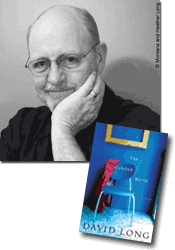 An Interview with
An Interview with
David Long
David Longís newest novel, The Inhabited World,
was released in hardcover this week. After reading this intriguing novel, I approached David for an interview:
Interviewer Janelle Martin: The Inhabited World (TIW) is a very intimate and introspective novel with deliberate pacing. Did you set the pace of the novel to mimic the way time passes for Evan?
David Long:Honestly, I canít say I thought of it that way. I do think itís an intimate look at a manís inspection of his completed life. As to pacing: it moves both quickly, in the sense that I try to remove every removable word and to say only what you donít already know, and yet languidly, too, in the sense that there are eddies where forward movement is suspended as memory kicks in.
What made you decide to place all the dialogue in italics?
Iíve always used a lot of italic―to clarify how a line is supposed to sound, or to indicate when a line comes from a different source from what surrounds it. In earlier books, I made this distinction: italic for remembered dialog, quotation marks for speech happening now. The more I read world literature, though, the more I understood that our method for rendering speech is just a convention weíve settled on, that writers elsewhere do it various ways, and that individual writers have their own preferences. For example, Portuguese Nobel Laureate, Josť Saramago (Blindness), embeds speech in the ongoing flow of his sentences―no new paragraph, no italic, no quote marks. You have to use your ears; but the thing is, you do. This technique is an essential element for Saramago, part of what gives his writing its power. Anyway, in my new novel, I took the logical next step (for me) of putting all speech in italic. I liked how clean it looked. At the same time, I did away with indentation. Each paragraph is a free-standing block of text, separated by a double space. It appealed to me aesthetically, and seemed necessary.
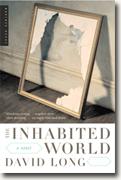 TIW has a limited setting, being confined to the house as is Evan. Was this a deliberate choice on your part, to limit the reader to the same venue as Evan?
TIW has a limited setting, being confined to the house as is Evan. Was this a deliberate choice on your part, to limit the reader to the same venue as Evan?
Point of view is central for me. A story is told by someone, from a specific angle. Change the narrator or the angle, and you have a different story. For years I wrote only short stories, and to some degree I still think like a short story writer. I zero in on one character through-out, or (as in my first novel, The Falling Boy) on one character at a time, for the space of a chapter. In The Inhabited World, weíre locked into Evan Molloyís POV, and, since Evan doesnít leave his former house and yard, the foreground story stays there, too. An omniscient narrator could tell you certain other things―for instance, whatís become of Evanís wife Claudia since his death. But this narration isnít omniscient; Evanís ignorance becomes the readerís.
Do you feel that the years youíve spent in Montana and Washington have influenced how you approach the use of space in your novels? TIW, while very enclosed in geographic scope, initially does not feel claustrophobic. Do you think an authorís location (NYC vs. Montana for example) has a bearing on how space is used in their novels? TIW would have been a very different work if the space was handled in a different way.
Reviewers of my Montana books often talked about ďthe harsh Western landscapesĒ in my work. The fact is, most of the time I was writing about a fertile mountain valley, not so harsh, not so barren or isolated. But then, most Montana writers suffer from typecasting by outsiders. Montana is a big place, and being surrounded by great quantities of space does have something to do with the Montana psyche, insofar as there is such a thing. But wher-ever I locate my fiction, my goal is to immerse myself in the characterís moment in time and space. I try to be the character, to notice what he or she would notice. In the new book, Evan is confined to the house and lot, but not by walls or fences―he simply has no will to go anywhere else. This is his spot. His task is to know it, to oversee it, and whereas his past life had become so stale he was sick of everything, now the smallest details of the physical world fascinate him. Thatís why, I think, thereís no sense of claustrophobia.
TIW is not the first novel in which you have explored the theme of menís infidelity. What illumination are you aiming to provide your readers by exploring this issue in your novels?
Here it is: Men are dogs. Not exactly a news flash. Anyway, novels are about peo-ple in the grip of change. Usually what this amounts to is that they make choices and have to live with the consequences. Infidelity is one of theseóitís a betrayal of a basic agreement people make with each other; itís the triumph of short-term gratification. It holds the poten-tial for drama (not to mention melodrama)―pain, breakup, and so forth. For many spouses, the betrayal is absolute―itís like dropping a crystal bowl on a marble floor. But for others thereís the possibility of forgiveness and reconciliation. Itís not the only thing I write about, though. My previous novel, The Daughters of Simon Lamoreaux, dealt with how we endure uncertainty, and how we either are or arenít scarred by our past.
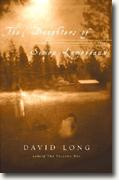 Where did the idea for Evanís companion, the ginger tom, come from? The idea that the cat might have cause to seek redemption is a very different one and seems to cause Evan some angst. If Evan believes himself to be Maureenís guardian angel, is the cat Evanís?
Where did the idea for Evanís companion, the ginger tom, come from? The idea that the cat might have cause to seek redemption is a very different one and seems to cause Evan some angst. If Evan believes himself to be Maureenís guardian angel, is the cat Evanís?
Excellent question! My working title for this novel was Purgatorio, so I was thinking of Danteís being shown around the underworld by his guide, Virgil. But it seemed to me that in my story, Evan had no guide. He was fundamentally alone; he had to figure things out for himself. Then, as I was writing, I saw the orange cat come stepping out of the bushes, and I thought, OK, letís give Evan this much companionship,ďone chink out of his vast solitude.Ē Later, when the cat disappears, Evan begins to see that his purgatory may not be permanent, and it tweaks the question of whether thereís a purpose or moral intelligence behind the whole business―because, after all, what kind of god would punish a cat?
You state in an earlier interview that winning battles can be a matter of outlasting your enemy when both are badly worn down. Both Maureen and Evan have been worn down by life and by the events in TIW and in a way, each is seeking redemption. Is redemption the prize for outlasting their personal enemies or is it getting a second chance?
Well, Evan doesnít get any more chances. He used his up. Heís an example of someone who couldnít scare up that vital five or ten percent of extra stamina to get through the dark time. What he can do is observe the world he left―in particular, Maureen. He wants her to avoid the failing he succumbed to. For her, I think ďredemptionĒ and ďa second chanceĒ are the same thing. Sheís tried to break free of a powerful married man sheís had an affair with. On the summer night that comprises the foreground of the book, she doesnít quite succeed. Evanís message for her is this: Donít give up. You were close, next time youíll make it. Since, as far as he can tell, thereís no contact between their two worlds, Evan has, until now, avoided speaking to her or trying to touch her. Tonight, though, at her lowest point, he does it anyway. I leave it to the reader to decide whether or not sheís influenced by him.
You list as influences many authors from other regions (Eastern Europe and Asia). TIW, to me, does not seem to be an ďAmericanĒ novel. Do you believe that there is a style of writing that can easily be described as ďAmerican?Ē
Another good question―but a complex one. I think a distinctly American sound came into our writing with Mark Twain, then with Stephen Crane, and later Hemingway. It was the sound of American speech; it was stripped down, concrete, less fussy than English or Continental writing; and, increasingly, our literature included the stories and idioms of people outside the ruling elite (however you wish to define that). At some point during the second half of the 20th Century, we seemed to enter an eclectic period―these days we have important writers all over the stylistic map. If I had to pick one writer who embodies a quintessential American sound it would be the Philip Roth of The Plot Against America. But thereís no shortage of others―writers as diverse as William Maxwell, Cormac McCarthy, Raymond Carver, Denis Johnson, Joyce Carol Oates, Anne Tyler, Joan Didion...
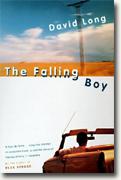 Do you think American authors tend to shy away from writing books that explore the nature of existence?
Do you think American authors tend to shy away from writing books that explore the nature of existence?
Scads of novels are published in this country every year. Most are genre writing―their pur-pose is to amuse, to kill time, to reinforce ideas people already hold. There are frivolous books in the ďliteraryĒ camp as well. Are there more now, have we become shallower as readers? Maybe. Iím not sure itís an answerable question. I know that remarkable, one-of-a-kind novels are published, too, and while their audience is limited, the audience for really good writing has always been limited. I do think thereís a strain of phi-losophical inquiry, a love of ideas, present in many European novelists, especially certain Eastern European writers.
I hate to generalize, but we seem to have a blockbuster mentality in this country, which is why our Hollywood films are, for the most part, childish and irrelevent. Every year I go to the Seattle International Film Festival and see several dozen good, smaller-budget movies from elsewhere in the world (as well as some ďindieĒ American films). They tend to be quirkier, stranger, more serious in a good way. They ďexplore the nature of existenceĒ as you put it. I think the same dynamic is at work in our writing, though to a lesser degree ―because novel-writing doesnít require a huge financial outlay, and because itís a singular rather than a collective endeavor.
How do you think 9-11 has affected the types of books Americans want to read, or at least what American publishing houses believe Americans are seeking?
Weíve seen an onslaught of nonfiction about terrorism, fundamentalist Islam, and related matters. And because the response by our government was (and continues to be) so ill-informed, so arrogant, so deceitful and catastrophically wrong-headed, weíve had books dissecting that, from both sides. As for fiction: You could argue that terrorism has sharpened our awareness of how politics intrudes on private life, and thus made us more receptive to novels attentive to these things―though, so far, only a handful of novelists have dealt with 9-11 directly (perhaps feeling queasy about the idea of ďcashing inĒ on the event). On the other hand, you could say that in difficult times people want to be diverted, entertained. Both are probably true.
I think our literature is evolving as a result of many forces. More significant than 9-11 is how we live now―everyone working to make the house payments or the rent, squeezed for time, bombarded by commitments, and by the noise of constant communication. Not a good an environment for reading. Yet, there are readers. And, to contradict what I said above, the Internet has linked readers to one another in an un-precedented way. Thereís a huge dialog going on. People are recommending books to each other, posting their own lists and reviews―otherwise obscure books are finding new life. And itís never been easier to buy a book. Five minutes of poking around, a few clicks, and an out-of-print Estonian novel is on its way to me from the U. K....
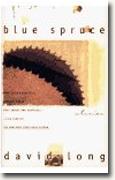 Thank you David for sharing your thoughts on The Inhabited World, writing and literature. Are you at liberty to discuss what you are currently writing?
Thank you David for sharing your thoughts on The Inhabited World, writing and literature. Are you at liberty to discuss what you are currently writing?
I do have another novel started. Itís too early to get into particulars, but I subscribe to the Python Principle: And now for something completely different. This one―well, I feel like Iím really out on a limb this time. But I always have grave doubts about my projects. My old poetry teach, Richard Hugo, believed that the best poets write the same poem over and over all their lives. In other words, we keep returning to our obsessions (ac-tually, I think, each of us has a handful of things we hammer away at). You can really see the truth of this when you look at a writer like Faulkner, where virtually all his mature writing came from his obsession with Yoknapatawpha County, Mississippi. When I was writing short stories I set quite a few in Sperry County, Montana, my version of the Flathead Valley. But then I left Montana, and since then itís seemed important to clear the decks each time, to see each book as its own aesthetic challenge. I think, finally, that my obsession doesnít have to do with theme or place―itís the drive to make really good sentences, one after another.
DAVID LONG is the author of Blue Spruce, The Falling Boy, and The Daughters of Simon Lamoreaux. His fiction has appeared in The New Yorker, GQ, Story, and numerous other publications, and has earned him an O. Henry Award, a Pushcart Prize, a Rosenthal Prize from the American Academy of Arts and Letters, and many other honors.
Contributing reviewer Janelle Martin interviewed David Long, author of The Inhabited World (see accompanying review), about his book via email for curledup.com. No part
of this interview may be reproduced without permission. Janelle Martin/2006.





